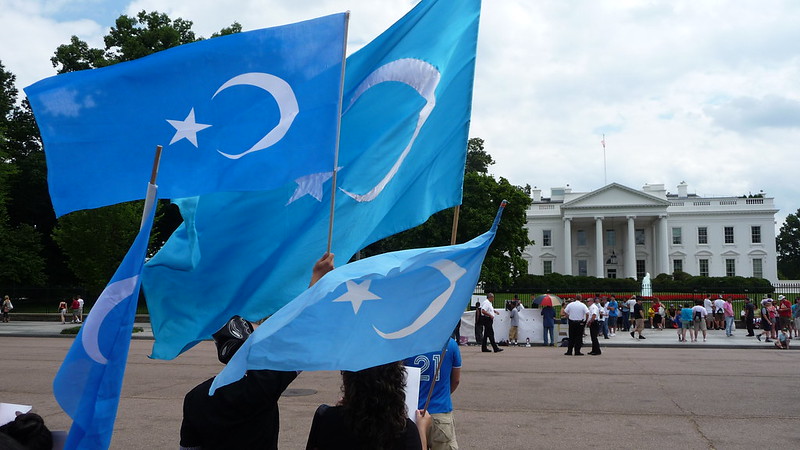China Is Operating Mass Detention Centers in Xinjiang. How Should the U.S. Respond?
What can the United States do to respond to China’s human rights abuses in Xinjiang? We outline potential congressional and executive actions available to U.S. lawmakers.

Published by The Lawfare Institute
in Cooperation With

Introduction
The world has known for over two years about China’s Xinjiang internment camps. But in November, newly leaked Chinese government documents—known as the China Cables—thrust China’s detention centers and surveillance programs into the international spotlight. The China Cables reveal the secret plans behind Beijing’s detention of more than 1 million Xinjiang residents—the majority of whom are ethnic Uighurs, a predominately Muslim minority group—for alleged “religious extremism.” The leaked documents portray the high-security camps as part of a systematic effort to erase Uighur culture and subject inmates to political indoctrination. Camp survivors have provided accounts of forced confessions, torture and rape. Chinese companies have also exploited detained Uighurs, forcing them to work without pay.
Washington has spoken up. Vice President Pence has rebuked China for the camps, and Secretary of State Mike Pompeo has called China’s oppression of Uighurs “the stain of the century.” In a recent letter to President Trump signed by legislators from both parties, Sen. Marco Rubio and Rep. James P. McGovern wrote that the United States “must respond to one of the greatest ongoing tragedies of our time.” But what can U.S. lawmakers do?
The U.S. will struggle to hold Chinese Communist Party officials accountable through international institutions. At the United Nations, China can use its seat on the Security Council to block any resolution calling for inspections of the camps. China has also lobbied allies for support: 54 nations, many of whom depend on Chinese investment, signed a statement in October supporting China’s “counterterrorism” strategies in Xinjiang. Some analysts have said that the International Criminal Court (ICC) should take up proceedings against Chinese officials. But China is not a “State Party” to the ICC, meaning that Chinese officials’ actions within the country will likely fall outside the court’s jurisdiction. The World Bank, where the United States has significant sway, did terminate a Xinjiang development project over human rights concerns. But most World Bank projects in China have little to do with Xinjiang.
Domestic options are more promising. Congress is poised to pass the Uighur Intervention and Global Humanitarian Unified Response (UIGHUR) Act of 2019, which calls upon President Trump to sanction Chinese officials, prohibits selling certain goods to China that it could use to suppress human rights, and mandates that the State Department report to Congress on conditions in Xinjiang. The Trump administration, meanwhile, has banned exports to 28 Chinese companies involved in the province’s human rights abuses.
But both Congress and the executive branch can do more. Congress should restrict imports from Xinjiang unless companies can demonstrate that their products did not come from forced labor camps. Meanwhile, the Trump administration should sanction the communist party officials responsible for building the camps and those responsible for violating religious freedoms, while granting temporary protections to Uighurs living in the United States.
Congressional Action
Congress should pass legislation restricting purchases of goods made in Xinjiang such as garments, cotton and textiles. Many such imports already contravene U.S. law, as the Tariff Act of 1930 bans importing goods produced with forced labor. But Congress can strengthen this statute with new legislation introducing a rebuttable presumption that goods from Xinjiang are produced with forced labor. As of now, U.S. Customs and Border Protection (CBP) must receive credible allegations linking specific goods to forced labor before barring their entry. Because Chinese companies employ byzantine ownership structures, and because China has kept reporters and nonprofits out of Xinjiang, CBP is ill equipped to identify which goods come from forced labor camps. Despite widespread reports of forced labor in Xinjiang, CBP has taken action against only one Chinese company operating in the region. A presumption against Xinjiang-made goods would solve this problem by shifting the burden onto U.S. importers to prove their purchases conform with existing law.
Congress has turned to such a burden-shifting maneuver before. It passed similar legislation regarding North Korean goods as part of the 2017 Countering America’s Adversaries Through Sanctions Act (CAATSA). Under that statute, imports of goods produced wholly or partly in North Korea can proceed only if CBP finds “clear and convincing” evidence that their production did not involve forced labor.
Sanctions restricting imports of Xinjiang-made goods would require thoughtful design and implementation. For one, legislation modeled after the North Korea provisions in CAATSA may fail to catch products that are assembled in other regions but include Xinjiang components. Nearly 80 percent of Xinjiang’s exported goods go to Kazakhstan, Kyrgyzstan and Tajikistan; and many of its exports are intermediate goods—the province accounts for roughly 84 percent of Chinese cotton, for instance. This means many goods without a Xinjiang label nonetheless involve Xinjiang labor. At the same time, a geography-based presumption may bar products from sources that have no connection to forced labor camps. And whatever goods are covered, the restrictions would raise costs for American companies buying those products today.
But these problems are surmountable. Supply-chain specialists and industry experts could assist lawmakers in designing the scope of any forced-labor presumption. The presumption could apply not only to goods exported from particular locations but also to specific types of Chinese-made goods known to frequently involve components from Xinjiang. Congress could also craft exceptions to the presumption in a way that moderates harms to businesses. And, if effective, the sanctions would not last indefinitely. Rather, they could be tied to concrete concessions by China, such as granting U.N. inspectors access to the Xinjiang camps, to keep them limited.
Executive Action
The Trump administration should impose financial sanctions on the Xinjiang officials responsible for constructing and maintaining the internment camps. Under the Global Magnitsky Act as implemented by Executive Order 13818, the president can require that U.S. financial institutions freeze assets of foreign persons responsible for “serious human rights abuses.” Such sanctions would not only hamstring Chinese officials who have assets abroad; they might also discourage ambitious communist party officials from seeking roles in Xinjiang’s police state.
The UIGHUR Act recommends Global Magnitsky sanctions against Chen Quanguo, the former communist party secretary of Xinjiang, who vastly expanded detention policy. But Trump should go further. He should also sanction Zhu Hailun, the second-ranking Xinjiang official who signed orders to build the camps. And as Rubio and McGovern recommend in their recent letter, the Trump administration should look into sanctioning the heads of other state organs. The Commerce Department last October found certain Xinjiang government entities to be “implicated in human rights violations” and prohibited them from buying U.S. technology. These entities’ leaders—such as Peng Jiarui, the Xinjiang Production and Construction Corps chief who oversees manufacturing plants linked to forced labor—may be prime candidates for Global Magnitsky sanctions.
Using his authority under the 1988 Wolf International Religious Freedom Act (IRFA), Trump should also sanction the officials responsible for violating Uighurs’ religious freedom. This law, which the UIGHUR Act also invokes, requires the president to sanction “Countries of Particular Concern”: those that “engage” in “systematic, ongoing and egregious violations of religious freedom.” The Trump administration already lists China as such a country, but it has pointed to preexisting sanctions against China to satisfy its IRFA obligations. Trump should give the law teeth. He should sanction the Xinjiang leadership of China’s United Front Work Department (UFWD), charged with managing the country’s “Religious and Ethnic Affairs” portfolio since 2018. The UFWD has supported Xinjiang authorities in revoking Uighurs’ passports, requiring Uighurs to wear GPS devices during the Hajj pilgrimage, and confiscating Qur’ans and prayer mats. By sanctioning UFWD leadership specifically for religious abuses, the Trump administration can highlight that the human rights crisis extends well beyond the walls of the high-security detention centers.
Sanctioning officials, though, does little to help many of those most in need. Uighurs abroad fear that China will detain them upon their return. Pursuant to its authority under the Immigration and Nationality Act, the Trump administration should issue an executive order to defer deporting Uighurs in the U.S. as long as the crisis continues. In 1990, President Bush issued a similar order for Chinese nationals in the U.S. after the events of Tiananmen Square. Building on Bush’s order, Congress passed the 1992 Chinese Student Protection Act, which granted green cards to more than 50,000 people covered by the order. An executive order today could likewise pave the way for congressional action to protect Uighur migrants.
Throughout his time in office, Trump has imposed highly controversial restrictions on immigration. But the president could frame protections for Uighurs as evidence that he is standing up to Beijing, at a time when the Republican Party—and the U.S. more broadly—has grown increasingly hawkish toward China. The president may also worry such a move would jeopardize trade negotiations with China. But the real roadblocks to a deal are disputes over Chinese economic policies and practices. China’s weak growth numbers, meanwhile, have put pressure on President Xi Jinping to stay at the negotiating table, even as the U.S. speaks out against Chinese policies in Xinjiang and Hong Kong.
Conclusion
U.S. action on Xinjiang would carry significant weight. With China’s growth sinking to its lowest level in decades, economic restrictions could hit hard. Washington could take action swiftly, with no need to coordinate among blocs of nations. And a decisive response could establish the U.S. as a leader on the Xinjiang crisis, encouraging other nations to take a stand. American policymakers should not lose this chance to be standard-bearers on one of today’s most pressing human rights challenges.






